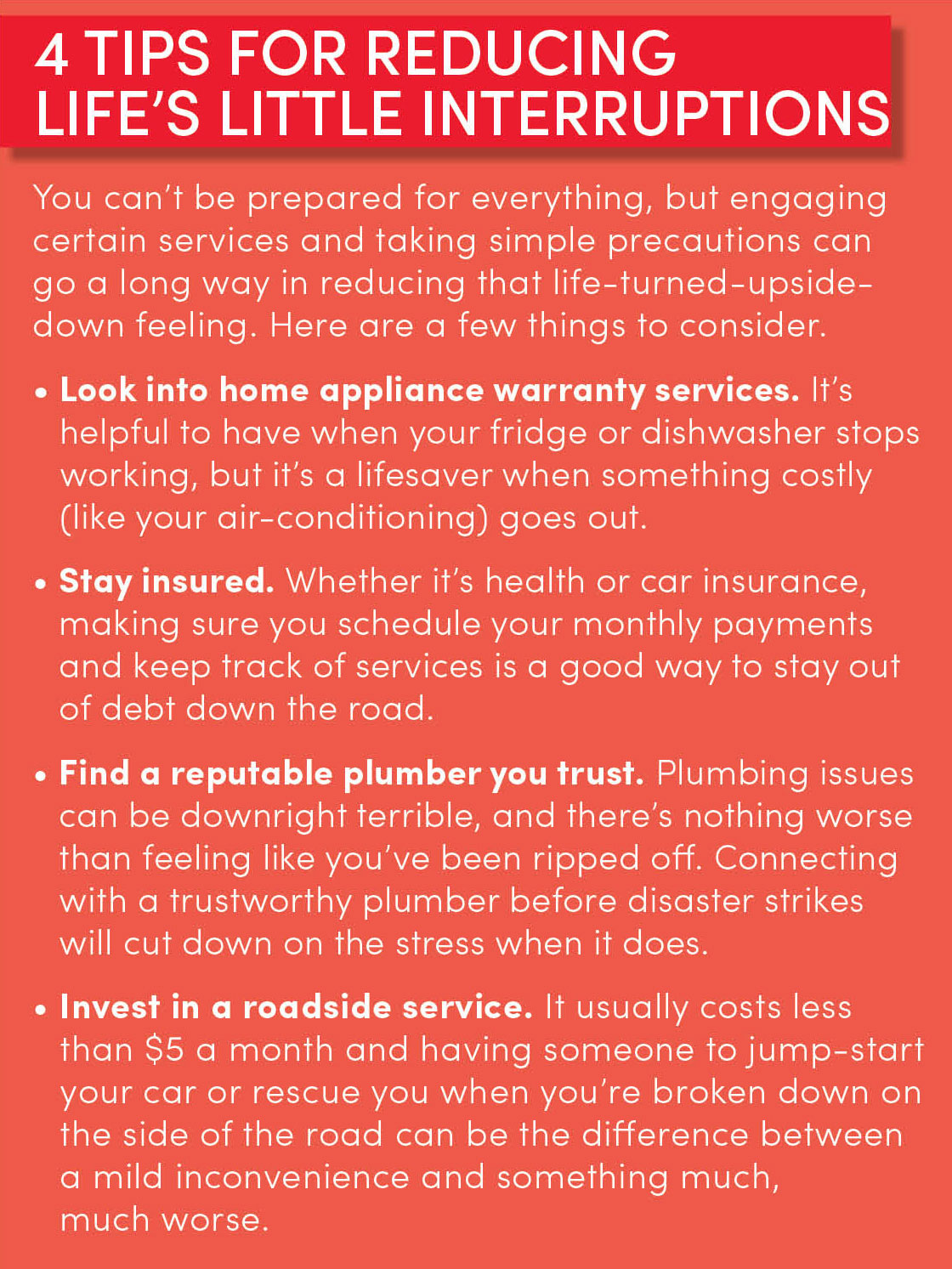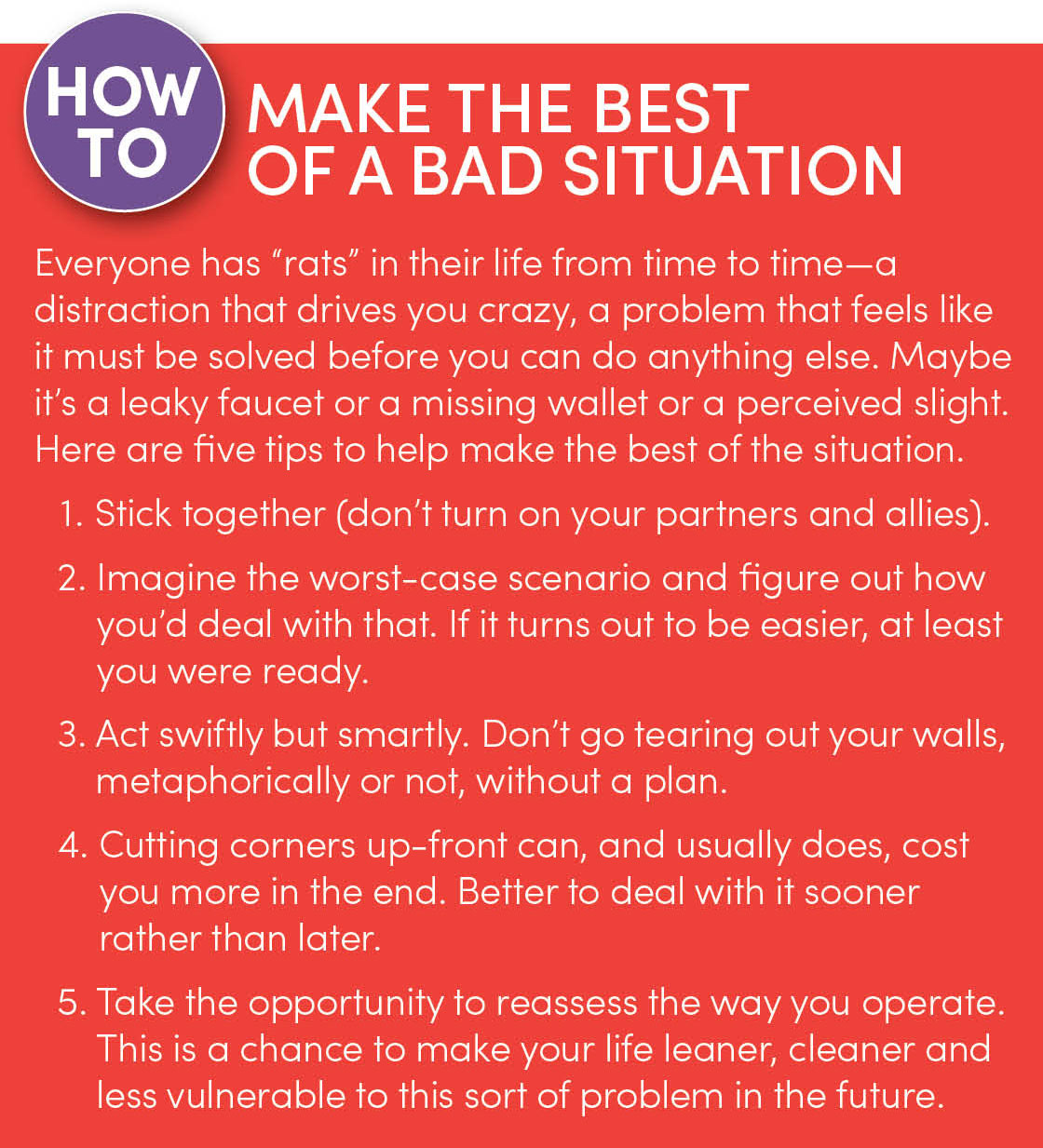My husband cooked pasta for dinner that night. We opened a bottle of red wine and stayed up late, talking and listening to music. It was a nice moment. I was settling into bed when he came running down the hall.
“I thought I saw a mouse,” Mike said, brandishing his iPhone flashlight.
We’d lived in our house for six years and never seen so much as a trace of rodent activity, inside or out, so I went to sleep and forgot about it. But the next morning, I discovered bits of dirt sprinkled around my home office. One of my ceramic plant pots had been raided, and the plants—fledgling succulents I’d been nurturing for weeks—were gone.
Mike immediately called an exterminator and drove to Lowe’s to buy a bag full of mouse traps: some humane catch-and-release models and some that snapped shut. “This way we give them a choice,” he said, feeling confident that we’d taken the first steps toward solving the problem. We strive hard to live ethically, so we hoped they’d go for the humane traps. We imagined taking mice to the park and releasing them. We used peanut butter as bait and set the traps along the walls. Looking back, the problem seemed so quaint at the time.
The next night, we’d just finished an episode of Game of Thrones. I switched the lights back on, and that’s when I saw the creature in question.

The word “mouse” conjures a teapot-dwelling character from a children’s book. It was easier to think we might be sharing space with the cast of An American Tail. Even the word mouse is sort of cute. This animal was not cute. Even in the split second before it ran and hid, I noted that it was big and hairy and gray, with a tail that seemed as long as one of Daenerys Targaryen’s dragon’s. It was immediately apparent that we had been kidding ourselves. We weren’t dealing with a mouse. This was a sewer dweller. A bubonic plague spreader. Rattus norvegicus. A rat!
Related: How to Be Confident in a Crisis
I was surprised by the pure physical intensity of my reaction. Maybe it’s cultural or maybe it’s evolutionary, but seeing a rat in your living space induces a special kind of shock. I immediately gasped and then felt an instinct to run away screaming. Instead I dug an old bat out of my closet. The thought of this disgusting animal crawling through our stuff, nibbling on our books and pooping in the corners of our rooms made me shudder. For the rest of the night, I thought I saw movement in my periphery—but over and over, there was nothing there.
The next day, I found that our vermin visitor had chewed through a bag of trail mix on the kitchen table. I bleached the table and began cleaning the house. My husband went back to the hardware store and bought a bag full of extra-large snap traps built for rats and put them all over the house.
That night, we convened in the kitchen. The exterminator was coming tomorrow, and we’d gone the whole day without hearing so much as a squeak. We wondered if we were almost in the clear. As we discussed it, I was sitting at the kitchen table. Mike was 8 feet away, standing by the sink.
That’s when the rat darted right between us—a shocking flash of gray fur—and jumped behind our fridge. My husband and I turned to each other and, in unison, unleashed hands-to-face, fully exasperated, lung-emptying screams. Like a scene in a bad horror movie, we continued to scream, even as the rat rustled around behind the refrigerator. By the end of the night, when we finally stopped screaming, we decided we definitely had a problem. And it was obviously worse than we thought.

Many years ago, my dad dealt with a rat problem in his attic. At the time, it was sort of an ongoing saga in our family. So I called him for advice. When I told him that my husband had gone to Lowe’s for the third time, to buy even more snap traps, he laughed. You’ve got a lot to learn, my dad said. Rats are too smart. They don’t fall for snap traps.
“To defeat the rat, you must study the rat,” he explained, sounding like the Mr. Miyagi of rodents. “You must become the rat.”
I absolutely did not want to become the rat. But he did have experience with this. At one point he installed night-vision cameras upstairs so he could monitor the rats on his laptop. At first it was funny—the way my story might be to a person who’s never actually had rats crawl through their stuff. My family referred to my dad’s setup as his “rat cam.” Then it became a little worrisome. For hours, days, weeks, the rats seemed to be all my dad thought about. Eventually he donned a hazmat suit and replaced all of his attic insulation. He patched holes and set traps, and after years of battle, vanquished his foes. But once you’ve shared space with rats, you’re never exactly the same.
Life is dotted with these kinds of interruptions. A day starts out normally, and life’s just humming along. Then something happens that immediately erases your plans. You leave early one morning for the gym only to find your car window broken. Or you’re talking with your spouse about a business plan, then notice your bathroom is flooded. Maybe an important investment tanks. Maybe your identity is stolen, or your kid breaks an arm, or the family dog runs away.

In a moment’s notice, the “rat” consumes all of your mind-space and requires all of your energy. You fall off your fitness routine because you miss the gym that day. You put the business on hold because you have to repair the bathroom and replace the hallway carpet. You’re too busy solving your problem, performing damage control, figuring out how to stop it from ever happening again. Even after you’ve done all you can, you stand around in a stupor, desperately trying to understand how it all happened in the first place.
Related: Use These Mental Techniques When Your Brain Is Overwhelmed

When the exterminator arrived, I was hopeful our rat horror story was approaching its conclusion. My optimism withered when the exterminator rambled around our property for five minutes, dropped a few bait boxes at the perimeters and handed my husband four old-school wooden mouse traps. The bait boxes, he explained, contained poison that could kill rats within seven days. That was assuming the rats would bother consuming the bait at all. And, if they had other food sources, they probably wouldn’t.
Life is dotted with these kinds of interruptions. A day starts out normally, and life’s just humming along. Then something happens that immediately erases your plans.
My husband coated the new traps with peanut butter and added them to our collection. Despite the fact that our kitchen floor now resembled a mine field, it had been four days and not a single rat had ventured into a trap. I couldn’t shake the nagging feeling that my dad was right—rats are too smart for traps. These rats had been playing the escape-from-humans game a lot longer than we’d been playing the catch-the-rats game.

Mike went back to the hardware store and returned with even more rat traps, including a $40 electronic trap that used four C batteries. “That’s never going to work,” I wanted to tell him, but he looked so optimistic that I couldn’t bring myself to crush his hopes. He felt a responsibility to protect me and solve the problem, but I knew he also felt helpless: Buying more traps was the only thing he could do, and at least that felt like something. It’s how my dad had felt in the early days of his rat problem.
That night, Mike had work to do. He set up his new traps and then retired to the upstairs office. All was quiet for a few hours.
Around midnight, he saw the flash of fur from the corner of his eye. I heard him shriek. I came running, baseball bat in hand. It was soon clear that the rat was attempting to go downstairs but had been surprised by the sight of my husband. Now it was hiding in the clutter of our upstairs office-slash-storage space.
I didn’t have the energy. I went to bed, but I was awakened several times throughout the night. At one point, I heard Mike yell desperately at the rat: “GET IN THE TRAP!” A few hours later I heard him talking to the rat, explaining calmly why it couldn’t live in our house. Yet another time, he was yelling to me, telling me to bring my bat upstairs. He’d cornered the rat briefly before it got away again, leaving him in despair. I groggily listed the new solutions running through my head: adopting a herd of hungry cats, filling our crawl space and attic with snakes, burning our entire house to the ground.
The next morning, I found that Mike had relocated his office to our dining room table. He told me that he’d be working downstairs till further notice. We’d officially ceded our second floor to the rat insurgency.

For thousands of years, humans have dwelled in the company of rats. For billions of people, it’s still a fact of life. So I try to keep perspective. And although thinking about rats makes my stomach queasy, I know this kind of First World struggle—as urgent and unpleasant and time-consuming as it is—doesn’t compare to the real tragedies.
The “rats” of life are a particular kind of inconvenience. They consume your thoughts in the moment. But these are the kinds of problems you might even laugh about later. (Much later. Decades later, maybe.) And they’re the kinds of problems that can push you toward making long-needed changes in your life.
Related: 7 Ways to Reinvent Yourself
My husband and I had become complacent in our living space. A foundation repair was long overdue. Our furniture was outdated. And we’d sorely neglected the nicest spot in our house—the sunroom. I’d once fantasized about turning it into a plush reading area, but over time, it became a dumping ground for junk. After noticing rat activity in this room, I set about cleaning it. I donated old electronics and several pairs of shoes. I crushed and recycled Amazon boxes. I threw away two dirty old rugs. I put our loveseat—nice, but too clunky for our space—on Craigslist. I undertook the gag-worthy job of bleaching our floor where rat droppings had accumulated. I felt productive, like I’d accomplished something I was embarrassed I’d neglected for far too long.

Any satisfaction was gone a few days later, though, when I woke up and found that another one of my plants had been shredded. In despair, I wondered if rats were our new reality. My dad had warned me how smart they are—a persistent superspecies perfectly evolved for chewing through walls, running at uncatchable speeds, jumping and climbing over anything. I knew that if we didn’t get rid of the rats, my husband and I would be living in a state of permanent interruption. Always on guard, always on edge.
I went back to bed—our only safe space, it seemed—and began researching on my phone. I was ready to take this rat war to the next level, whatever that meant.
I found the website for a wildlife removal service called Critter Control. The company had a good rating with the Better Business Bureau and boasted several positive reviews. When we called to make an appointment, the receptionist told us to expect someone soon.
The company representative arrived that afternoon and spent two hours at our house. He walked around our property and showed us all of the places in our exterior that needed to be sealed. He pointed out the nest the rats had made in our attic insulation. He used the scary word infestation. We expected the cost estimate to be astronomical.
It certainly wasn’t cheap—roughly two mortgage payments—but he said what we needed to hear: The problem would be solved.
Not yet, though. We still had three days before the crew was scheduled to come out and start work. To fill the time, I drove out to see my parents. My dad and I went for a run at the park, and I told him about Critter Control. He told me I’d need glue traps. I considered that in silence. I’ve always been the kind of person who catches bugs and takes them outside instead of killing them. I knew glue traps were cruel, but if the alternative was allowing disease-carrying vermin to flourish inside my house, what choice did I have?
When I came home that night, the situation had spiraled out of control. Mike had been chasing a rat around all evening. He had an assignment due, but he hadn’t been able to concentrate long enough to make progress. Every time he got to work, he’d see or hear a rat, then jump up and try to track it. The rat would hide, and the cycle would repeat a few minutes later. A small furry creature was driving my big furry creature to the brink of insanity.
Related: How to Handle Work When You Have Crisis at Home

On Tuesday afternoon, Critter Control arrived. The four-man crew set to work immediately, replacing our insulation, sealing our house, removing the rats’ pheromones, disinfecting any area rats had touched and spraying deterrent in every direction. When they left, five hours later, our house smelled brand-new. The whole operation had been expensive and inconvenient, but it felt good to have it done. It also added value to our house, if we ever decide to sell. I thought about some of the less pressing upkeep we’d been putting off, like foundation repair and bathroom upgrades.
The “rats” of life are a particular kind of inconvenience. They consume your thoughts in the moment. But these are the kinds of problems you might even laugh about later. (Much later. Decades later, maybe.) And they’re the kinds of problems that can push you toward making long-needed changes in your life.
Critter Control installed a one-way exit door so the rats could leave but wouldn’t be able to come back in. They also echoed my dad’s advice: Glue traps are the only ones that work. I sighed. My husband went out and bought a dozen.
The next evening, I went to a lecture at an art gallery. When I got home, feeling relaxed and fancy, I found that my husband had laid his glue traps and then left for a work assignment. I walked past the stairs and froze. One of the traps—positioned on the landing, our rats’ favorite highway—had actually done its work. Stuck to the glue, but very much alive, was a rat.
By now our house was full of rat traps. We hadn’t caught anything, and honestly, I didn’t expect we ever would. When I finally stopped screaming, I called my dad, who congratulated me on the victory. “You’re becoming one with the rat,” he said. In a screechy voice I told him that I couldn’t leave the poor thing on that trap for another minute.
The rat was so big I joked later that it actually might have been a small bear. Every human instinct I had was directing me to run far, far away from it. Shuddering, I followed my dad’s instructions and donned a face mask, goggles and heavy gloves. Then I scooped the rat up and took it outside. For weeks I’d wanted that rat out of my house at any cost. It had terrorized us, defecated on our floors, and destroyed my plants. But it had been a worthy opponent, and I didn’t want it to suffer. In the end, I wanted a painless demise for the rat that had been the bane of my existence.

I don’t know the laws on these things so I won’t get into what happened next, but once the deed was done, I went back inside, sickened but surprised at my own resolve. I rewarded myself with a long shower.
Then I looked around my house. I saw piles of stuff we didn’t need, furniture I wanted to get rid of, and a lot of long-overdue maintenance issues. I saw a rat’s paradise, replete with places to hide and junk to dig through. The rats had given me a new lens through which to view my home, my world. Maybe I really had become one with the rat.
In the end, the infestation was just an interruption. But it was an interruption that left us with a changed perspective. Today, we’ve already had a few foundation repair estimates. We’ve made plans to renovate our guest bathroom. We’ve donated boxes of clothes, books, kitchen gadgets and other miscellany. We’ve thrown out and recycled the actual trash we were hoarding, like old jars and takeout cutlery. We’ve started looking for new living room furniture.
The wildlife removal service comes with a lifetime guarantee. As we start and complete other renovations and updates to our home, we’ll always have a powerful ally should another rat battle arise.
I haven’t seen a rat in a while, and I’m optimistic it’ll stay that way. Every so often, though, Mike and I will hear something. We’ll stop everything and stare at each other with wide eyes, straining to listen, fearful of what might be making the noise. So far it’s been nothing. But we know that at some point, whether it’s a rat or some other awful thing we’ve never even thought of, we’ll have to deal with another intrusion in our lives. And when we do, we’ll find a way to handle it.
Related: 5 Ways the Power of ‘I Can’ Changes You
This article originally appeared in the January 2018 issue of SUCCESS magazine.








